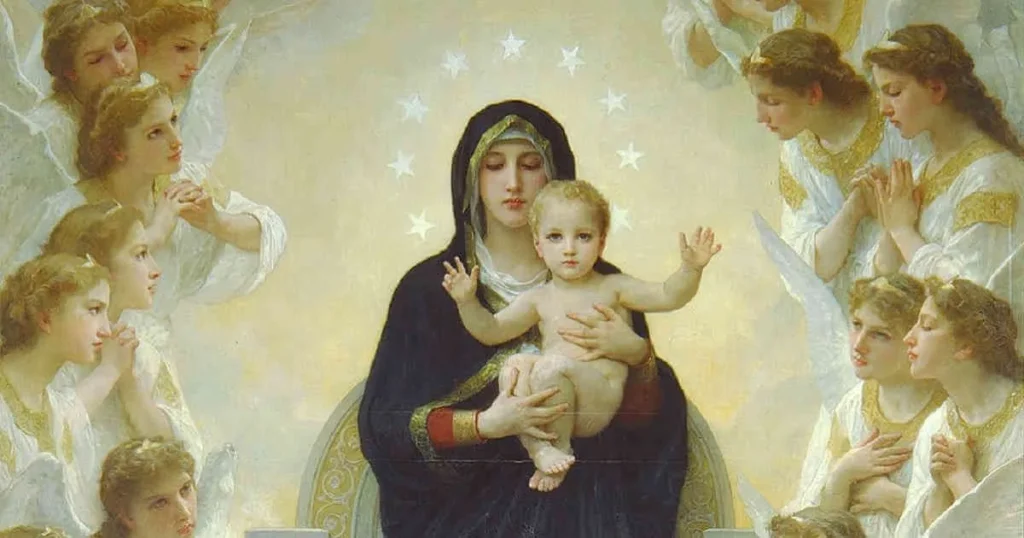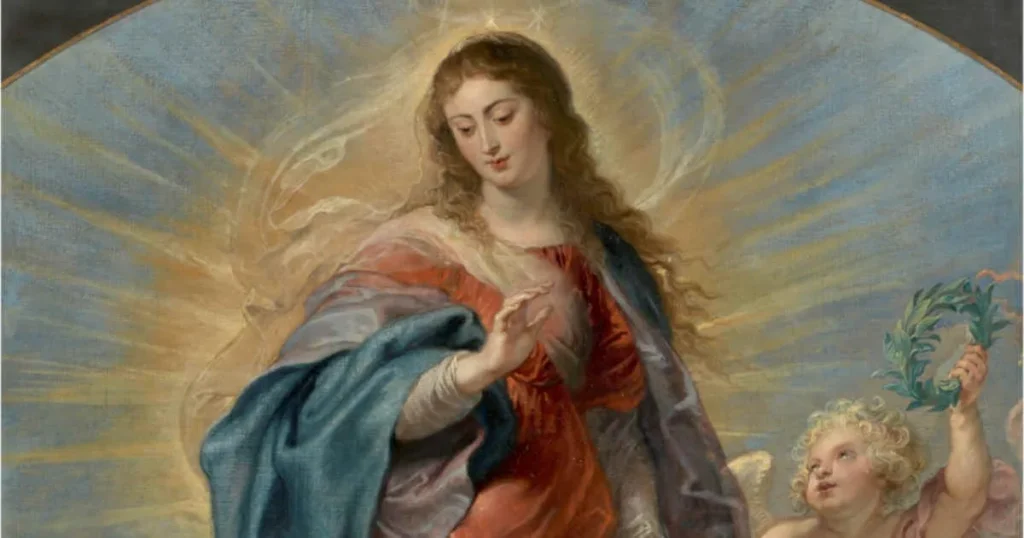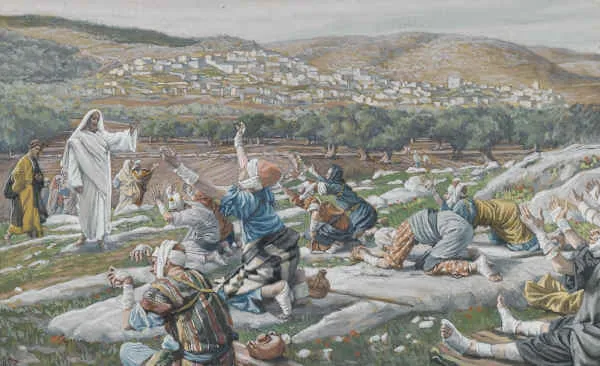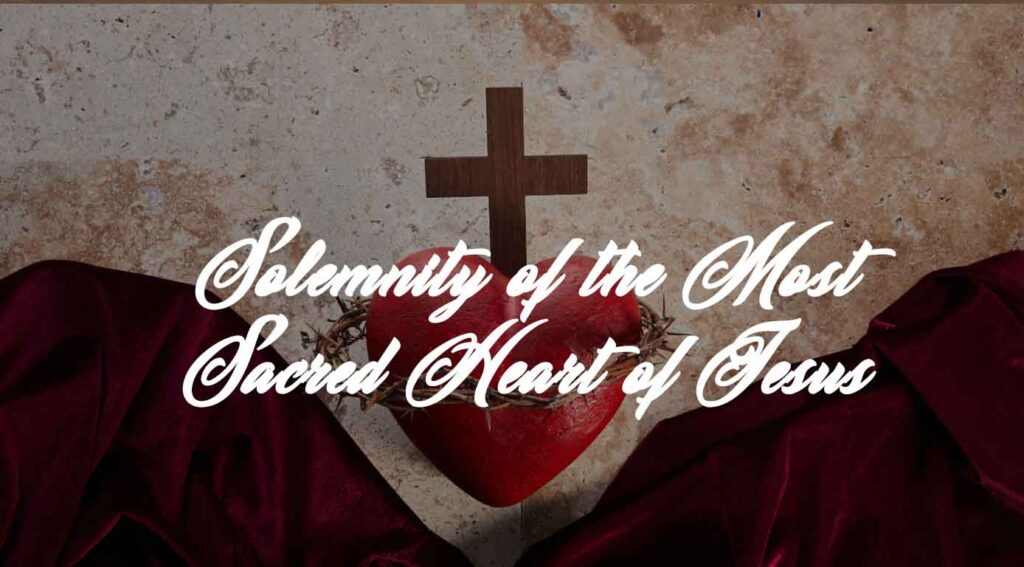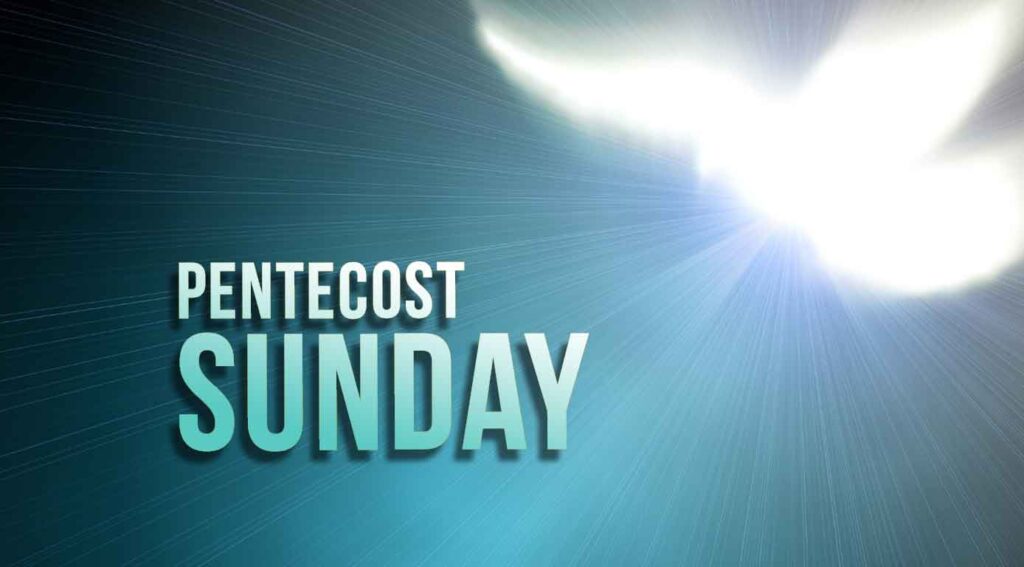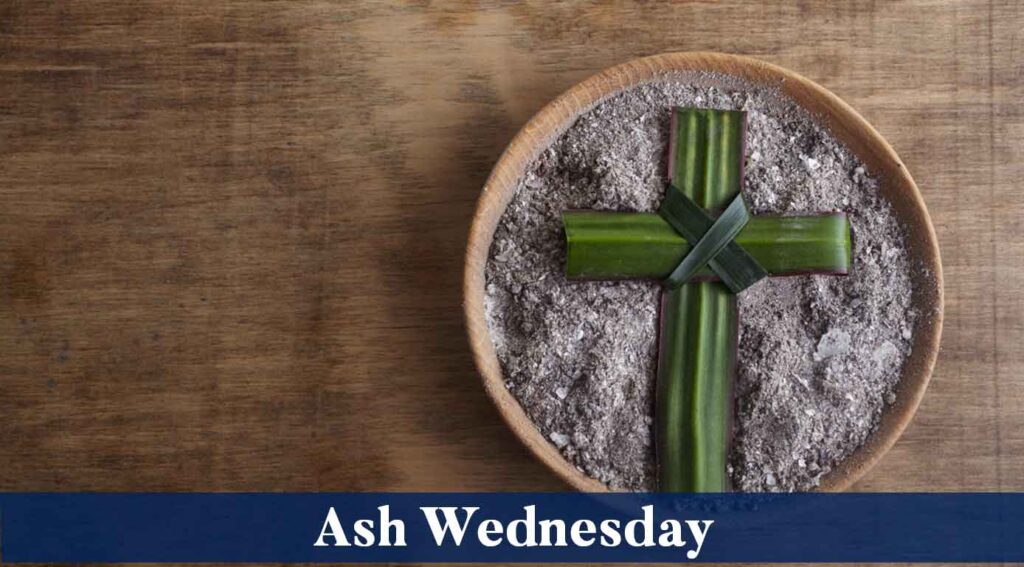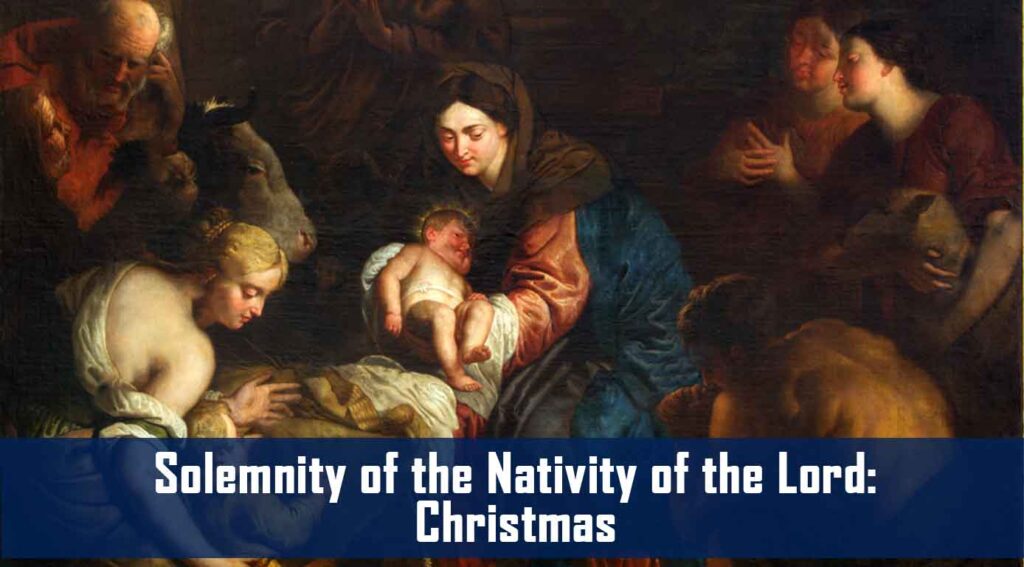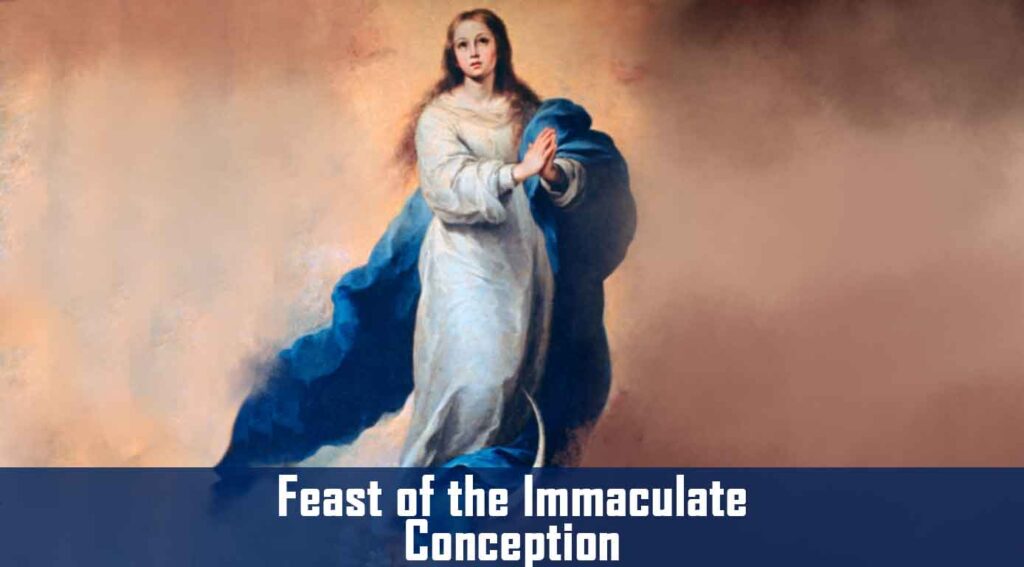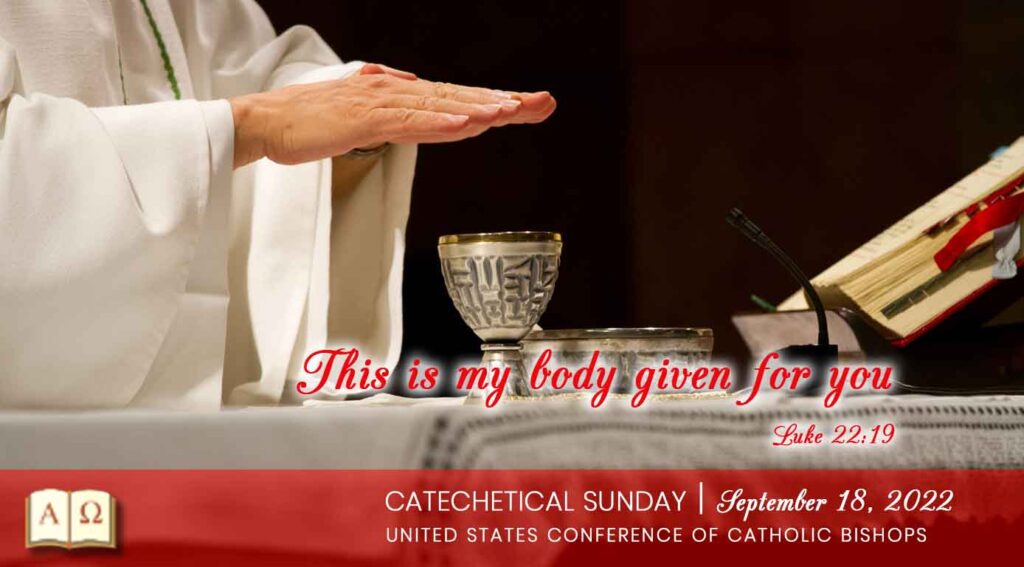Solemnity of the Blessed Virgin Mary, the Mother of God, The Octave Day of Christmas
Solemnity of the Blessed Virgin Mary, the Mother of God, The Octave Day of Christmas Read More »
The LORD said to Moses:
“Speak to Aaron and his sons and tell them:
This is how you shall bless the Israelites.
Say to them:
The LORD bless you and keep you!
The LORD let his face shine upon
you, and be gracious to you!
The LORD look upon you kindly and
give you peace!
So shall they invoke my name upon the Israelites,
and I will bless them.”
R. (2a) May God bless us in his mercy.
May God have pity on us and bless us;
may he let his face shine upon us.
So may your way be known upon earth;
among all nations, your salvation.
R. May God bless us in his mercy.
May the nations be glad and exult
because you rule the peoples in equity;
the nations on the earth you guide.
R. May God bless us in his mercy.
May the peoples praise you, O God;
may all the peoples praise you!
May God bless us,
and may all the ends of the earth fear him!
R. May God bless us in his mercy.
Brothers and sisters:
When the fullness of time had come, God sent his Son,
born of a woman, born under the law,
to ransom those under the law,
so that we might receive adoption as sons.
As proof that you are sons,
God sent the Spirit of his Son into our hearts,
crying out, “Abba, Father!”
So you are no longer a slave but a son,
and if a son then also an heir, through God.
R. Alleluia, alleluia.
In the past God spoke to our ancestors through the prophets;
in these last days, he has spoken to us through the Son.
R. Alleluia, alleluia.
The shepherds went in haste to Bethlehem and found Mary and Joseph,
and the infant lying in the manger.
When they saw this,
they made known the message
that had been told them about this child.
All who heard it were amazed
by what had been told them by the shepherds.
And Mary kept all these things,
reflecting on them in her heart.
Then the shepherds returned,
glorifying and praising God
for all they had heard and seen,
just as it had been told to them.
When eight days were completed for his circumcision,
he was named Jesus, the name given him by the angel
before he was conceived in the womb.
Source: https://bible.usccb.org/bible/readings/010124.cfm
Solemnity of the Blessed Virgin Mary, the Mother of God, The Octave Day of Christmas Read More »
After the man, Adam, had eaten of the tree,
the LORD God called to the man and asked him, “Where are you?”
He answered, “I heard you in the garden;
but I was afraid, because I was naked,
so I hid myself.”
Then he asked, “Who told you that you were naked?
You have eaten, then,
from the tree of which I had forbidden you to eat!”
The man replied, “The woman whom you put here with me–
she gave me fruit from the tree, and so I ate it.”
The LORD God then asked the woman,
“Why did you do such a thing?”
The woman answered, “The serpent tricked me into it, so I ate it.”
Then the LORD God said to the serpent:
“Because you have done this, you shall be banned
from all the animals
and from all the wild creatures;
on your belly shall you crawl,
and dirt shall you eat
all the days of your life.
I will put enmity between you and the woman,
and between your offspring and hers;
he will strike at your head,
while you strike at his heel.”
The man called his wife Eve,
because she became the mother of all the living.
R. Sing to the Lord a new song, for he has done marvelous deeds.
Sing to the LORD a new song,
for he has done wondrous deeds;
His right hand has won victory for him, his holy arm.
R. Sing to the Lord a new song, for he has done marvelous deeds.
The LORD has made his salvation known:
in the sight of the nations he has revealed his justice.
He has remembered his kindness and his faithfulness
toward the house of Israel.
R. Sing to the Lord a new song, for he has done marvelous deeds.
All the ends of the earth have seen
the salvation by our God.
Sing joyfully to the LORD, all you lands;
break into song; sing praise.
R. Sing to the Lord a new song, for he has done marvelous deeds.
Brothers and sisters:
Blessed be the God and Father of our Lord Jesus Christ,
who has blessed us in Christ
with every spiritual blessing in the heavens,
as he chose us in him, before the foundation of the world,
to be holy and without blemish before him.
In love he destined us for adoption to himself through Jesus Christ,
in accord with the favor of his will,
for the praise of the glory of his grace
that he granted us in the beloved.
In him we were also chosen,
destined in accord with the purpose of the One
who accomplishes all things according to the intention of his will,
so that we might exist for the praise of his glory,
we who first hoped in Christ.
R. Alleluia, alleluia.
Hail, Mary, full of grace, the Lord is with you;
blessed are you among women.
R. Alleluia, alleluia.
Solemnity of the Immaculate Conception of the Blessed Virgin Mary Read More »
“Ten were cleansed, were they not? Where are the other nine? Has none but this foreigner returned to give thanks to God?” Then he said to him, “Stand up and go; your faith has saved you.”
Luke 17:17–19
Reflection:
Though Thanksgiving Day is not specifically a Church holy day, gratitude is certainly central to our Christian faith, as is illustrated by today’s Gospel in which ten lepers were healed by Jesus. And their communal reaction is something of which to take note. Nine of them were healed and went about their business, not returning to the source of their healing to thank Him. But one did. This one leper, who was suddenly no longer a leper, returned to Jesus, glorified Him, fell at His feet and thanked Him. This one leper was a foreigner, a Samaritan, but he manifested a faith that we must all strive to imitate. The faith of this Samaritan was evident by the fact that he knew he needed to not only be grateful for the grace of healing but that he also needed to express it.
Reflect, today, upon the attitude that you have toward the many blessings God has bestowed upon you. Begin by considering the central blessings of God’s creation and His saving acts of love. From there, try to ponder the many small ways that God has been with you, guided you, strengthened you, and blessed you abundantly. If you do not see these clearly, then use this day to consciously listen so that God can reveal them to you. As you see your blessings, respond as this one leper. Turn to Jesus, glorify Him, fall at His feet in prayer and thank Him. Doing so will fill you with the same saving faith granted to this one leper.
Source: https://catholic-daily-reflections.com/2023/11/22/gratitude-for-immeasurable-blessings-2/
Moses said to the people:
"You are a people sacred to the LORD, your God;
he has chosen you from all the nations on the face of the earth
to be a people peculiarly his own.
It was not because you are the largest of all nations
that the LORD set his heart on you and chose you,
for you are really the smallest of all nations.
It was because the LORD loved you
and because of his fidelity to the oath he had sworn your fathers,
that he brought you out with his strong hand
from the place of slavery,
and ransomed you from the hand of Pharaoh, king of Egypt.
Understand, then, that the LORD, your God, is God indeed,
the faithful God who keeps his merciful covenant
down to the thousandth generation
toward those who love him and keep his commandments,
but who repays with destruction a person who hates him;
he does not dally with such a one,
but makes them personally pay for it.
You shall therefore carefully observe the commandments,
the statutes and the decrees that I enjoin on you today."
Response– The Lord's kindness is everlasting to those who fear him
Bless the LORD, O my soul;
all my being, bless his holy name.
Bless the LORD, O my soul;
and forget not all his benefits.
R– The Lord's kindness is everlasting to those who fear him
He pardons all your iniquities,
heals all your ills.
He redeems your life from destruction,
crowns you with kindness and compassion.
R– The Lord's kindness is everlasting to those who fear him
Merciful and gracious is the LORD,
slow to anger and abounding in kindness.
Not according to our sins does he deal with us,
nor does he requite us according to our crimes.
R– The Lord's kindness is everlasting to those who fear him
Beloved, let us love one another,
because love is of God;
everyone who loves is begotten by God and knows God.
Whoever is without love does not know God, for God is love.
In this way the love of God was revealed to us:
God sent his only Son into the world
so that we might have life through him.
In this is love:
not that we have loved God, but that he loved us
and sent his Son as expiation for our sins.
Beloved, if God so loved us,
we also must love one another.
No one has ever seen God.
Yet, if we love one another, God remains in us,
and his love is brought to perfection in us.
This is how we know that we remain in him and he in us,
that he has given us of his Spirit.
Moreover, we have seen and testify
that the Father sent his Son as savior of the world.
Whoever acknowledges that Jesus is the Son of God,
God remains in him and he in God.
We have come to know and to believe in the love God has for us.
God is love, and whoever remains in love
remains in God and God in him.
Alleluia, alleluia. Take my yoke upon you, says the Lord; and learn from me, for I am meek and humble of heart. Alleluia, alleluia.
A reading from the holy Gospel according to Matthew
At that time Jesus exclaimed:
"I give praise to you, Father, Lord of heaven and earth,
for although you have hidden these things
from the wise and the learned
you have revealed them to little ones.
Yes, Father, such has been your gracious will.
All things have been handed over to me by my Father.
No one knows the Son except the Father,
and no one knows the Father except the Son
and anyone to whom the Son wishes to reveal him.
"Come to me, all you who labor and are burdened,
and I will give you rest.
Take my yoke upon you and learn from me,
for I am meek and humble of heart;
and you will find rest for yourselves.
For my yoke is easy, and my burden light."
Solemnity of the Most Sacred Heart of Jesus Read More »
When the time for Pentecost was fulfilled,
they were all in one place together.
And suddenly there came from the sky
a noise like a strong driving wind,
and it filled the entire house in which they were.
Then there appeared to them tongues as of fire,
which parted and came to rest on each one of them.
And they were all filled with the Holy Spirit
and began to speak in different tongues,
as the Spirit enabled them to proclaim.
Now there were devout Jews from every nation under heaven staying in Jerusalem.
At this sound, they gathered in a large crowd,
but they were confused
because each one heard them speaking in his own language.
They were astounded, and in amazement they asked,
“Are not all these people who are speaking Galileans?
Then how does each of us hear them in his native language?
We are Parthians, Medes, and Elamites,
inhabitants of Mesopotamia, Judea and Cappadocia,
Pontus and Asia, Phrygia and Pamphylia,
Egypt and the districts of Libya near Cyrene,
as well as travelers from Rome,
both Jews and converts to Judaism, Cretans and Arabs,
yet we hear them speaking in our own tongues
of the mighty acts of God.”
Response– Lord, send out your Spirit, and renew the face of the earth
Bless the LORD, O my soul!
O LORD, my God, you are great indeed!
How manifold are your works, O LORD!
the earth is full of your creatures.
R–Lord, send out your Spirit, and renew the face of the earth
May the glory of the LORD endure forever;
may the LORD be glad in his works!
Pleasing to him be my theme;
I will be glad in the LORD.
R–Lord, send out your Spirit, and renew the face of the earth
If you take away their breath, they perish
and return to their dust.
When you send forth your spirit, they are created,
and you renew the face of the earth.
R–Lord, send out your Spirit, and renew the face of the earth
Brothers and sisters:
No one can say, “Jesus is Lord,” except by the Holy Spirit.
There are different kinds of spiritual gifts but the same Spirit;
there are different forms of service but the same Lord;
there are different workings but the same God
who produces all of them in everyone.
To each individual the manifestation of the Spirit
is given for some benefit.
As a body is one though it has many parts,
and all the parts of the body, though many, are one body,
so also Christ.
For in one Spirit we were all baptized into one body,
whether Jews or Greeks, slaves or free persons,
and we were all given to drink of one Spirit.
Sequence: Veni, Sancte Spiritus
Come, Holy Spirit, come!
And from your celestial home
Shed a ray of light divine!
Come, Father of the poor!
Come, source of all our store!
Come, within our bosoms shine.
You, of comforters the best;
You, the soul’s most welcome guest;
Sweet refreshment here below;
In our labor, rest most sweet;
Grateful coolness in the heat;
Solace in the midst of woe.
O most blessed Light divine,
Shine within these hearts of yours,
And our inmost being fill!
Where you are not, we have naught,
Nothing good in deed or thought,
Nothing free from taint of ill.
Heal our wounds, our strength renew;
On our dryness pour your dew;
Wash the stains of guilt away:
Bend the stubborn heart and will;
Melt the frozen, warm the chill;
Guide the steps that go astray.
On the faithful, who adore
And confess you, evermore
In your sevenfold gift descend;
Give them virtue’s sure reward;
Give them your salvation, Lord;
Give them joys that never end. Amen.
Alleluia.
Alleluia, alleluia. Come, Holy Spirit, fill the hearts of your faithful
and kindle in them the fire of your love. Alleluia, alleluia.
A reading from the holy Gospel according to John
On the evening of that first day of the week,
when the doors were locked, where the disciples were,
for fear of the Jews,
Jesus came and stood in their midst
and said to them, “Peace be with you.”
When he had said this, he showed them his hands and his side.
The disciples rejoiced when they saw the Lord.
Jesus said to them again, “Peace be with you.
As the Father has sent me, so I send you.”
And when he had said this, he breathed on them and said to them,
“Receive the Holy Spirit.
Whose sins you forgive are forgiven them,
and whose sins you retain are retained.”
Ash Wednesday marks the first day of Lent, which occurs 46 days before Easter. It is a solemn reminder of human mortality and the need for reconciliation with God.
Many Christians begin Ash Wednesday by marking a Lenten calendar, praying a Lenten daily devotional, and making a Lenten sacrifice. Ash Wednesday derives its name from this practice, which is accompanied by the words, “Repent, and believe in the Gospel” or the dictum “Remember that you are dust, and to dust you shall return.”
The ashes are prepared by burning palm leaves from the previous year’s Palm Sunday celebrations. The ash is applied in the shape of a cross on the forehead of each worshipper on Ash Wednesday.
It is an obligatory day of fasting and abstinence, where only one full meal and no meat are to be consumed.
How beautiful upon the mountains
are the feet of him who brings glad tidings,
announcing peace, bearing good news,
announcing salvation, and saying to Zion,
“Your God is King!”
Hark! Your sentinels raise a cry,
together they shout for joy,
for they see directly, before their eyes,
the LORD restoring Zion.
Break out together in song,
O ruins of Jerusalem!
For the LORD comforts his people,
He redeems Jerusalem.
The LORD has bared his holy arm
in the sight of all the nations;
all the ends of the earth will behold
the salvation of our God.
Response– All the ends of the earth have seen the saving power of God.
Sing to the LORD a new song,
for he has done wondrous deeds;
his right hand has won victory for him,
his holy arm.
R– All the ends of the earth have seen the saving power of God.
The LORD has made his salvation known:
in the sight of the nations he has revealed his justice.
He has remembered his kindness and his faithfulness
toward the house of Israel.
R– All the ends of the earth have seen the saving power of God.
All the ends of the earth have seen
the salvation by our God.
Sing joyfully to the LORD, all you lands;
break into song; sing praise.
R– All the ends of the earth have seen the saving power of God.
Sing praise to the LORD with the harp,
with the harp and melodious song.
With trumpets and the sound of the horn
sing joyfully before the King, the LORD.
R– All the ends of the earth have seen the saving power of God.
Brothers and sisters:
In times past, God spoke in partial and various ways
to our ancestors through the prophets;
in these last days, he has spoken to us through the Son,
whom he made heir of all things
and through whom he created the universe,
who is the refulgence of his glory,
the very imprint of his being,
and who sustains all things by his mighty word.
When he had accomplished purification from sins,
he took his seat at the right hand of the Majesty on high,
as far superior to the angels
as the name he has inherited is more excellent than theirs.
For to which of the angels did God ever say:
You are my son; this day I have begotten you?
Alleluia, alleluia. A holy day has dawned upon us. Come, you nations, and adore the Lord. For today a great light has come upon the earth. Alleluia, alleluia!
A reading from the holy Gospel according to John
In the beginning was the Word,
and the Word was with God,
and the Word was God.
He was in the beginning with God.
All things came to be through him,
and without him nothing came to be.
What came to be through him was life,
and this life was the light of the human race;
the light shines in the darkness,
and the darkness has not overcome it.
A man named John was sent from God.
He came for testimony, to testify to the light,
so that all might believe through him.
He was not the light,
but came to testify to the light.
The true light, which enlightens everyone, was coming into the world.
He was in the world,
and the world came to be through him,
but the world did not know him.
He came to what was his own,
but his own people did not accept him.
But to those who did accept him
he gave power to become children of God,
to those who believe in his name,
who were born not by natural generation
nor by human choice nor by a man’s decision
but of God.
And the Word became flesh
and made his dwelling among us,
and we saw his glory,
the glory as of the Father’s only Son,
full of grace and truth.
John testified to him and cried out, saying,
“This was he of whom I said,
‘The one who is coming after me ranks ahead of me
because he existed before me.’”
From his fullness we have all received,
grace in place of grace,
because while the law was given through Moses,
grace and truth came through Jesus Christ.
No one has ever seen God.
The only Son, God, who is at the Father’s side,
has revealed him.
Solemnity of the Nativity of the Lord: Christmas Read More »
A feast called the Conception of Mary arose in the Eastern Church in the seventh century. It came to the West in the eighth century. In the 11th century it received its present name, the Immaculate Conception. In the 18th century it became a feast of the universal Church. It is now recognized as a solemnity.
In 1854, Pius IX solemnly proclaimed: “The most Blessed Virgin Mary, in the first instant of her conception, by a singular grace and privilege granted by almighty God, in view of the merits of Jesus Christ, the savior of the human race, was preserved free from all stain of original sin.”
It took a long time for this doctrine to develop. While many Fathers and Doctors of the Church considered Mary the greatest and holiest of the saints, they often had difficulty in seeing Mary as sinless—either at her conception or throughout her life. This is one of the Church teachings that arose more from the piety of the faithful than from the insights of brilliant theologians. Even such champions of Mary as Bernard of Clairvaux and Thomas Aquinas could not see theological justification for this teaching.
Two Franciscans, William of Ware and Blessed John Duns Scotus, helped develop the theology. They pointed out that Mary’s Immaculate Conception enhances Jesus’ redemptive work. Other members of the human race are cleansed from original sin after birth. In Mary, Jesus’ work was so powerful as to prevent original sin at the outset.
https://www.franciscanmedia.org/saint-of-the-day/immaculate-conception-of-the-blessed-virgin-mary
Feast of the Immaculate Conception Read More »
“This is my body given for you.” – Luke 22:19
Catechetical Sunday is a wonderful opportunity to reflect on the role that each baptized plays, by virtue of Baptism, in handing on the faith and being a witness to the Gospel. This year, the Church will celebrate Catechetical Sunday on September 18, 2022 , and the theme is: “This is my body given for you.” Those who the parish community has designated to serve as catechists will be called forth to be commissioned for their ministry.
Catechetical Sunday Read More »
This year’s celebration will fall on Sunday, 24th of July, the Sunday closest to the Feast of Saints Joachim and Anne, Grandparents of Jesus. The theme chosen by Pope Francis for this year’s celebration is: “In old age they will still bear fruit” (Psalm 92:15).
The Catholic Grandparents Association has been at the forefront in campaigning for a greater recognition of Grandparents for their role and vocation in passing on their faith to the next generation. The announcement of a new Church-wide celebration for Grandparents and the elderly came in answer to our prayerful request to the Holy Father Pope Francis.
This new worldwide celebration in the Universal Church calendar is a momentous achievement for Grandparents and the Elderly and will hopefully reassure them that they are loved and that they are needed.
World Day for Grandparents and the Elderly Read More »
Add San Jose Filipino Ministry as a new recipient, Send your donation using"donate@dosjfm.org"
Payable to - San Jose Filipino Ministry
Address - 1235 S Magnolia Ave Anaheim, CA 92804-5115
1235 S.Magnolia Ave. Anaheim, CA 92804-5115
info@dosjfm.org
1235 S.Magnolia Ave. Anaheim, CA 92804-5115
info@dosjfm.org
Add San Jose Filipino Ministry as a new recipient, Send your donation using"donate@dosjfm.org"
Payable to - San Jose Filipino Ministry
Address - 1235 S Magnolia Ave
Anaheim, CA 92804-5115
San Jose Filipino Ministry. All rights reserved. 2021 © Powered by Phoenix Virtual Solutions
Sponsored by EverClear Hospice and Palliative Care
